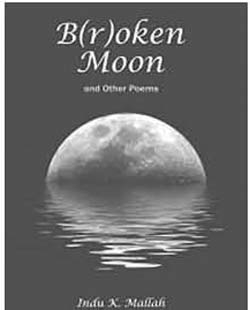In her first book of poetry Indu Mallah has chosen as her epigraph an exquisite poem by Ralph Nazareth. The glassblower’s art becomes a metaphor for the art of writing: ‘I’ve seen / Glassblowers/ stretch little / Into much. / Such is my hope / For words—/ Blowing syllables up / To hold a world / Close to breaking.
The first part of the poems in this collection deals with her family, husband, sons, daughter. The feelings of intense love, pain and loss pervade this section. In the first poem, ‘Meeting Points’, is to her husband, whom death snatched away. The philosophizing in this poem doesn’t quite work. But the last line: ‘The dagger-thrust of grief / Still jack-knifes me’ is powerful, and says it all. Her agony, which never leaves her is expressed in ‘Prayaschitam’. ‘Fragments Of Foam’ brings together her poetic consciousness with her sense of the beauty of the world: ‘I shore up these fragments of foam /Against the desert of my despair.’ Poetry itself can be the source of healing, poets may realize, as it makes whole the fragmented and torn parts of the being.
Indeed, her desperate search for meaning and connection, which leads her to the edge of the abyss brings her to a new path: A new force emerges / A new path beckons. I resist, I rebel, But an unseen shuttle Picks up the broken strand of my life And weaves it into the mesh again.
A very fine metaphor for the struggle which keeps us going, despite the terrible odds.
Mallah’s poems for her children, in the first section of the book, are among the most moving in the connection, resonating as they do with tender love and feeling, sometimes laced with hurt. The letting go is perhaps the hardest part of motherhood, but the most important. In the poem for her daughter, Roshi (‘Fly Away Paloma’): ‘I watch helplessly as you singe your wings/Like Icarus, as you wing your way/towards the sun of freedom.’
In ‘For My Littlest son’: ‘Each time you leave home,/I die another death….
Go safely as you go to meet your destiny,/and wear my love as an amulet/ In the battle field of life.’
In ‘Collage’, she is flooded with memories: A floral collage, a patchwork quilt of yesterdays/Would that I could freeze them forever.’
Indu Mallah has organized her poems in different sections perhaps because the subjects, and her preoccupations, are so very different in thought, mood and character. I feel this break-up distracts the reader, who cannot get a grip on the central mood or direction the poet wishes to share with us. She uses the ‘blank page’ to comfort, cocoon and inspire, setting the stage for a literary life! But terrible dreams haunt her and ‘from the dark depths/Of desolation,/Surged up a spring of insights/Laced with blood, salt, ice,/ And the ache of swallowed tears.’ The poems that follow, however, are less about this inner life, and more about matters of public interest, such as ‘International Women’s Day’, ‘The Farmer and the Politician’, ‘Human Rights Day’ or ‘In sterile seminars/historians discuss lost civilizations.’ In this section, the poet seems to move away from the raw pain of her inner feelings.

